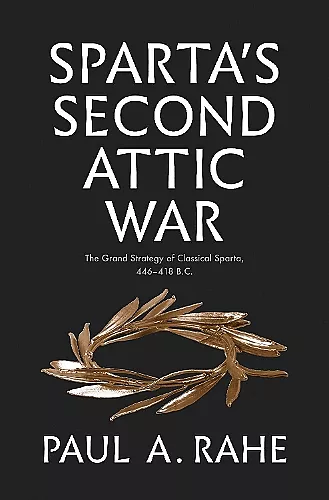Sparta's Second Attic War
The Grand Strategy of Classical Sparta, 446-418 B.C.
Format:Hardback
Publisher:Yale University Press
Published:8th Sep '20
£32.50
Available to order, but very limited on stock - if we have issues obtaining a copy, we will let you know.

The latest volume in Paul Rahe’s expansive history of Sparta’s response to the challenges posed to its grand strategy
“Paul Rahe stands out as one of the world’s leading scholars on the Peloponnesian War. His latest volume on Sparta’s protracted struggle with Athens provides insight into enduring problems of politics and strategy in wartime, into why and how peoples fight, both in the ancient world and in our own troubled times.”—John H. Maurer, Naval War College
In a continuation of his multivolume series on ancient Sparta, Paul Rahe narrates the second stage in the six‑decades‑long, epic struggle between Sparta and Athens that first erupted some seventeen years after their joint victory in the Persian Wars. Rahe explores how and why open warfare between these two erstwhile allies broke out a second time, after they had negotiated an extended truce. He traces the course of the war that then took place, he examines and assesses the strategy each community pursued and the tactics adopted, and he explains how and why mutual exhaustion forced on these two powers yet another truce doomed to fail. At stake for each of the two peoples caught up in this enduring strategic rivalry, as Rahe shows, was nothing less than the survival of its political regime and of the peculiar way of life to which that regime gave rise.
“Throughout, discussions of treaty negotiations in particular are excellent. The reader is left with a clear sense of the stakes, the skulduggery and machinations, and the full implications of the final terms reached. Rahe’s prose is engaging and dramatic.”—Thomas O. Rover, International Journal of Military History and Historiography
“Written in a rich, rewarding style…Its coverage of ancient sources and modern literature in the notes is impressively exhaustive and it includes numerous and very good maps. Related to this, topography is Rahe’s strong point – several passages have benefitted from his detailed personal knowledge of the landscape.”—Pavel Nývlt, Eirene, Studia Graeca et Latina
“The general reader will find the narrative stimulating, while, even if scholars disagree with some of R.’s conclusions, they will find them provocative, intriguing and cogently argued.”—David Stuttard, Classics for All
“[Enriches] the existing literature by providing a fresh and convincing argument about the importance of domestic politics in international conflict”—Konstantinos Xypolytos, Strife Journal
Winner of the Themistocles Prize awarded by the University of Piraeus
“Paul Rahe stands out as one of the world’s leading scholars on the Peloponnesian War. His latest volume on Sparta’s protracted struggle with Athens, Sparta’s Second Attic War, provides insight into enduring problems of politics and strategy in wartime, into why and how peoples fight, both in the ancient world and in our own troubled times.”—John H. Maurer, Naval War College
“The West’s victory in the Cold War may not have been the equal of the early 5th century Greek victory over the Persians. But, as Paul Rahe’s Sparta’s Second Attic War explains in elegantly crafted language, the notion of resolving global-sized confrontations is a modern conceit. Based on an understanding that equals that of any contemporary strategic thinker, Rahe examines the upheavals in the Hellenic world that followed Persia’s defeat, the roots of dissension in the geography of Sparta and Athens, and the influence of domestic policy on the contestants’ diplomatic and military maneuvers.”—Seth Cropsey, former deputy Undersecretary of the Navy
“Rahe’s far-reaching and audacious reconstruction of ancient Greek history proceeds apace. This is more than military history, more than diplomatic history. It exhibits not only his magisterial command of a vast, complicated body of facts, but his comprehensive understanding of the larger context of strategic thinking then and now.”—Ralph Lerner, The University of Chicago
ISBN: 9780300242621
Dimensions: 235mm x 156mm x 27mm
Weight: unknown
408 pages